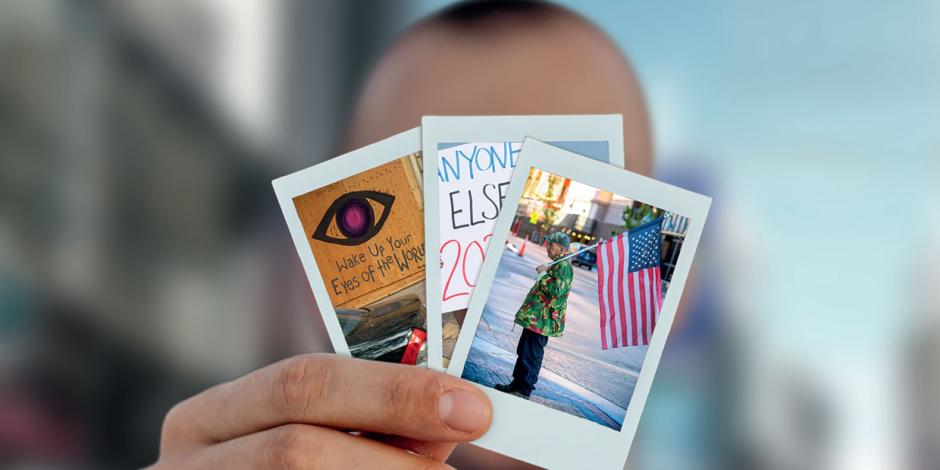There are deep divisions running through US society — through every community, through every town and county, through every city and state, through the country
itself. These divisions are destroying friendships and sometimes splitting whole families.
While many like blame: to lay the ~ on sbjmdm. die Schuld zuschreibento lay the blame for these ruptureRissruptures on the current US president and, more recently, on the coronavirus, the polarization of US society began long before Donald Trump take officesein/ihr Amt antretentook office, or the pandemic began ravageverwüsten, verheerenravaging the country. True, Trump’s presidency has been characterized by the kind of blisteringhier: massiv, beißendblistering personalized attacks seldomseltenseldom seen before in US politics, and the pandemic is the kind of once-in-a-lifetime emergency that has unnerved us all. Yet America’s political schismSpaltungschism, the deeply conflicted attitudes toward immigration, and the racial tensionSpannungtensions that became visible after the killing of George Floyd in Minneapolis on May 25 — all these are conflicts with a long history. They have been deepening for decades, if not for centuries, and have been exploitausnutzenexploited by politicians of every stripe: of every ~jeder Couleurstripe. In many ways, their existence was fundamental to making a Trump presidency possible.
Every nation’s political turmoilAufruhrturmoil has ingredients all of its own. For America, belief in the sanctityUnantastbarkeitsanctity of individual rights is probably the defining one. What that means is, of course, open to interpretation, but one thing is for sure: The overwhelmingüberwältigendoverwhelming majority of Americans feel — justifiablyberechtigterweisejustifiably or not — that their rights are now under threat, or that it is finally time these rights were reassertwieder geltend machenreasserted.
So, as the election on November 3 approaches with the country deep in a pandemic and financial crisis, I reached out to a diversevielfältigdiverse group of Americans with wide-ranging political perspectives and experiences. I asked them what they make of the polarization in America, what they hope for in the November elections, and ways they think that America might be able to close some of these divisions after the elections.
Sue A.
Sue A. is a California registered nurse, with specialty certification in neonatalNeugeborenen-neonatal intensive care.
Spotlight: As someone who works in public health, what do the upcomingbevorstehendupcoming elections mean in terms of public health, the virus? And do you see anything that could heal all of the anger and divisions across the country?
Sue A.: I do, actually, feel optimistic about the future of medicine, despite the pandemic. When I look at my circle of friends and family, almost all of them do some sort of volunteer work to improve the world. I have had multiple people offer to give me their only N95 masks to bring to work, so that I can safely care for babies.
Kind actions are a little boring when it comes to the news
I think generous, kind actions are a little boring when it comes to the news and so we really are not aware of the proportion of kind versus greedy people. It would be wonderful if our government could facilitateerleichtern, begünstigenfacilitate public health, and I think that the regulations for healthcare have made huge improvements over the last 35 years in safety for hospitalized patients.
My hospital went bankrupt approximately 20 years ago and had to be bought by a for-profit company to remain open. We have a hodgepodgeN. Am.
, Kuddelmuddel-hodgepodge way of treating people without insurance, and it’s a full-time job for anyone to try to figure out how to navigate the current healthcare system. I also chose to work in a well-supported part of healthcare because it was too stressful to try to give good care in other areas.
Archer Ruffin, Jr.
Ruffin is a fifth-generation farmer in Charles City County, Virginia.
Spotlight: As a moderate conservative, what are your main concerns as we approach the November elections?
Archer Ruffin, Jr.: I worry about the Democrats controlling both the White House and Congress. We need some checks and balancesGewaltenteilungchecks and balances. I think most of us agree that the whole system is broken. So, what happened to the moderates? Where did they go? Moderate politicians should speak up and take a standStellung beziehentake a stand. I think they’re cowardFeiglingcowards now. I think that they’ve been forced too far to the left. The same has happened to the Republicans: They’ve moved too far to the right.
Democrats are too much about big government
I’m no fan of Trump’s, but what he did to reduce taxes was good for the economy. Biden wants to raise corporate taxKörperschaftsteuercorporate taxes. It’s going to mean that more businesses move out of America. And that means a loss of jobs in this country. And this also means that there’s less revenueEinkommenrevenue coming in to fund government spending — including for social programs. These businesses could go to many other competitive places around the world. Democrats are too much about big government.
Jennifer Eremeeva
Eremeeva is a freelance writer living in Massachusetts.
Spotlight: As someone who lived and worked abroad for so many years, what do you think the coming elections mean for the US’s position in the world?
Jennifer Eremeeva: I have not always agreed with US foreign policy, but until President Trump’s tenureAmtszeittenure, I was always proud of America’s core valuesGrundwertecore values of freedom and equality. I felt confident that in moments of global catastrophe, we would help to lead a global response. I no longer feel that way. President Trump has squanderverschwendensquandered the goodwill of our allies by pander to sth.etw. bedienenpandering to the needs of our adversaryGegner(in)adversaries.
President Trump has squandered the goodwill of our allies
For me, one of the most important outcomes of a Trump defeat will be the immediate restoration of our global allianceBündnisalliances and our reputation in the world. No less important is the immediate reversalUmkehrreversal of the disastrous response to the coronavirus pandemic, which has so clearly been behind the needless loss of life on an unprecedentednoch nie dagewesenunprecedented scaleAusmaßscale.
Neugierig auf mehr?
Dann nutzen Sie die Möglichkeit und stellen Sie sich Ihr optimales Abo ganz nach Ihren Wünschen zusammen.



